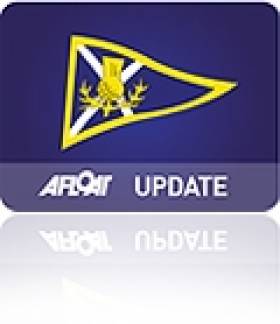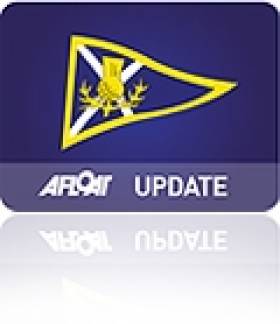Displaying items by tag: Loch Fyne
Festival Feel for Scotland's Biggest Sailing Series
#scottishseries – The organisers of Scotland's bigest sailnig event, the Brewin Dolphin Scottish Series at Tarbert have announced changes on and off the water at this year's event, creating a festival of sailing for competitors and spectators alike. The Clyde Cruising Club has also renewed its appeal for Irish sailors to come to Tarbert, an event Cork sailors have previously won overall.
This year's Brewin Dolphin Scottish Series will take place over the Queen's Jubilee weekend from Friday 1 June to Monday 4 June in Tarbert, Loch Fyne, on Scotland's stunning West Coast, a week later than usual.
The focus is on quality racing with three race areas on the broad waters of the Loch providing racing for IRC classes, One Design classes and CYCA (Scottish) Handicap classes (with and without spinnakers). Those taking part can also expect to see:
New courses for all classes providing variety and alternatives to standard windward/ leeward courses
The introduction of a single daytime Inshore Coastal Race on Sunday 3 June for IRC classes
The Round the Island Race on Sunday 3 June is open to all yachts with CYCA handicaps to join the Scottish Series yachts in CYCA classes to race for the day
In addition, the RS Elite Class Association is hosting the Scottish leg and first of their four Grand Slam Events at the Brewin Dolphin Scottish Series, while the Laser SB3 Class Association will hold their Scottish National Championship during the event.
Organisers also anticipate a hive of activity shoreside by concentrating activities on the north shore of Tarbert, where yachts will be berthed. Amongst various entertainment line-ups, visitors will see the marquee back in full swing. The new shoreside marquee complex will include a bar where competitors can meet, relax and socialise post racing. The daily prize-giving will also be held in the new marquee complex. Competitors and visitors can expect to continue experiencing the hustle and bustle of Tarbert throughout the Jubilee holiday weekend.
John Watson, Commodore of Clyde Cruising Club, commenting on the changes said, "We anticipate this year's Brewin Dolphin Scottish Series to be even more exciting than in previous years. It will be great to see the likes of last year's winner, Jackaroo from IRC 3, returning to defend his trophy and previous winners returning hoping to wrest it back.
"We hope for more than 100 entries and 1000 crew and supporters again this year and think the changes being made to the event structure will promote a festival of sailing on and off the water.
"We would encourage more sailors from across the UK and further afield to consider entering the event and past competitors to continue to return to the stunning waters of Loch Fyne to soak up the wonderful atmosphere Tarbert has to offer."
New Courses for All Fleets at Scottish Series
Today (7 January) Clyde Cruising Club, organisers of sailing's Brewin Dolphin Scottish Series, announced exciting developments for the 2011 event. The Scottish Series will see a refreshed offering, both on the water and shoreside, benefitting competitors and spectators a like. The news will be of interest to members of ICRA,
The 2011 Brewin Dolphin Scottish Series takes place over the bank holiday weekend from Friday 27 to Monday 30 May in Tarbert, Loch Fyne in the Clyde Estuary. Three race areas on the broad waters of the Loch will provide separate racing for IRC classes; One Design classes and CYCA classes (with and without spinnakers).
Clyde Cruising Club's main aim has been to provide fresh challenges for competitors, which has prompted changes including:
New courses for all fleets, providing variety to the standard windward/leeward course
The introduction of an Inshore Coastal (daytime) race for IRC classes which will take place during the weekend
Limitations to crew numbers
Some shore based start lines for the CYCA classes
Replacing the IRC sportsboats handicap starts with One Design class starts
2011 introduces a 'Laird of the Loch' event, an invitational competition between 2010 class winners in One Designs which will take place immediately before the Series on Thursday 26 May
Commodore John Watson, who takes over the role from Howard Morrison for the 2011 event, said "This is an exciting time for us, the event and the competitors. Over the last couple years we realised that the event needed rejuvenating and thought it was time to give it a bit of a shake up. Our main aim in changing the event has been to inject more fun and exciting elements of sailing to Tarbert.
"We hope that this refreshed offering will encourage more sailors from across the UK and further afield to consider entering the event and that past competitors will continue to return to the stunning waters of Loch Fyne."
Jamie Matheson, Chairman of Brewin Dolphin, title sponsors of the Scottish Series said "We have been sponsoring the Scottish Series for the past eleven years and think the proposed changes to the event format will offer something new and challenging for competitors."
"Clyde Cruising Club introduced these changes as a result of competitor consultation and it will be interesting to see how the developments influences sailing – it will no doubt make the event more enjoyable for all taking part."
Competitors are being encouraged to sign up early. Further details and race entry forms for this year's Brewin Dolphin Scottish Series are available now from the Brewin Dolphin Scottish Series website.































































